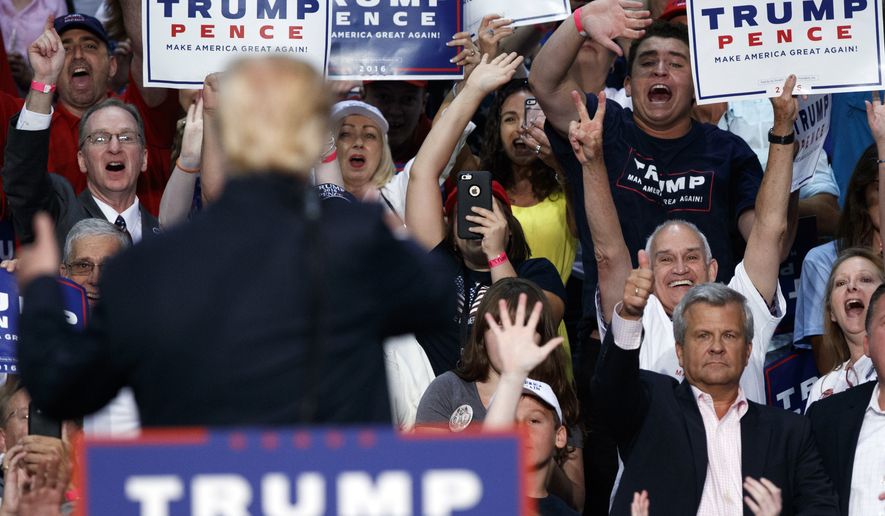The tea party movement, which dominated Republican elections in 2010 and 2012 and forced Congress to move to the right policywise, has hit a rough patch.
House Tea Party Caucus Chairman Tim Huelskamp lost his primary this week, meaning one of the movement’s leading voices on Capitol Hill will go silent.
Meanwhile, on the presidential campaign trail, Sen. Rand Paul’s presidential hopes fizzled out quickly, Sen. Ted Cruz of Texas was booed off stage at the Republican National Convention and Sen. Marco Rubio is now seen by many as a member of the GOP establishment.
The reversal of fortune has left tea party leaders wondering where it went downhill — and the answer they keep coming back to is Donald Trump.
“I had been predicting a tea party resurgence in 2016 because I thought the climate was right for it, but the only problem was that a guy named Donald Trump came along and basically co-opted the movement,” said Judson Phillips, head of Tea Party Nation.
While Mr. Trump has the anti-establishment credentials tea partyers craved, his stances — and questions over how strongly he is committed to conservative principles — have deeply divided voters.
Ken Crow, a tea party activist in Iowa, said the “tea party is in turmoil” over how to feel about Mr. Trump.
“The hard-core tea party wanted a strict constitutional guy like a Mike Lee or Ted Cruz — someone who prays, loves the Constitution, loves guns and waives the flag,” he said. “But the more pragmatic tea partyers realized that Ted Cruz could not win, so they jumped aboard the Trump train.
“They got their outsider, it just so happens that he is not a conventional outsider, and now they are starting to go ’oops,’” Mr. Crow said.
Heading into this year’s elections, tea party types were excited about their options, with Mr. Cruz and Mr. Paul vying for different factions, and Mr. Rubio offering a potential bridge between the tea party and the establishment wing of the Republican Party.
But Mr. Paul was quickly ousted from the race, Mr. Rubio dropped out after a poor showing in his home state of Florida, and Mr. Cruz canceled his campaign after failing to overcome Mr. Trump in a one-on-one fight in Indiana in May.
All the while, Mr. Trump was gaining steam, powered by folks enraged at Washington — the same anger that drove the tea party.
“The people who have gone for Trump are the people I like to refer to as the angry crowd,” said Mr. Phillips. “Some of these people, I don’t think they even know what they are even angry about. I think a lot of the movement conservatives, where conservatism is more than a punchline for them, have not gotten on the Trump bandwagon.”
At the same time Mr. Trump is grabbing some of its power, the tea party is still fighting its old battle against the party establishment — and losing.
Mr. Huelskamp’s loss Tuesday to Roger Marshall was the latest black eye.
Mr. Marshall, an obstetrician-gynecologist, had the backing of the U.S. Chamber of Commerce and made the case that Mr. Huelskamp’s battles with Republican leaders had hurt the region’s agricultural industry.
“It is the ongoing civil war in the Republican Party with the Chamber of Commerce wing at war with movement conservatives,” Mr. Phillips said.
Jenny Beth Martin, of the Tea Party Patriots Citizens Fund, said the fact that the establishment took such pains to defeat Mr. Huelskamp was, in itself, a victory for the tea party.
“If the establishment were not concerned about the tea party, they would not have spent millions of dollars working to defeat Tim Huelskamp,” Ms. Martin said, adding that that money could have better spent defending the Senate GOP majority or taking down liberal Democrats.
Mr. Huelskamp served as chairman of the House Tea Party Caucus for just over a year, after taking the reins from Rep. Michelle Bachmann of Minnesota, whose own 2012 presidential bid flamed out. She now sits on the Evangelical Executive Advisory Board for Mr. Trump.
Asked whether tea partyers are unified around Mr. Trump, Ms. Martin, whose group endorsed Mr. Cruz, said the tea party movement is “unified on not wanting Hillary Clinton to be president.”
“We are united on wanting to repeal Obamacare. We are united on wanting to secure the border,” she said. “While in any movement there are going to be differences on strategy and tactics and preferences on candidates, we still are united on our end goal, and that end goal is to expand freedom in America and to get to a debt-free future.”
• Seth McLaughlin can be reached at smclaughlin@washingtontimes.com.




Please read our comment policy before commenting.